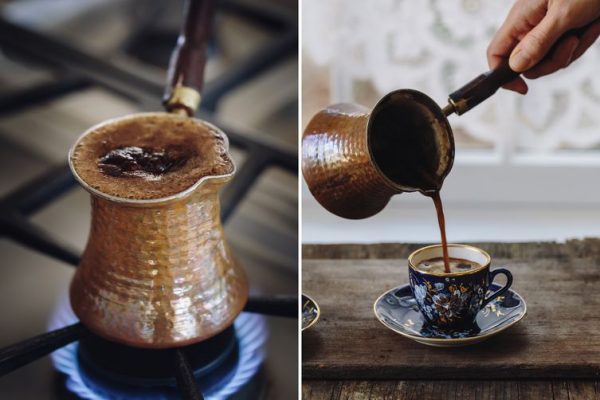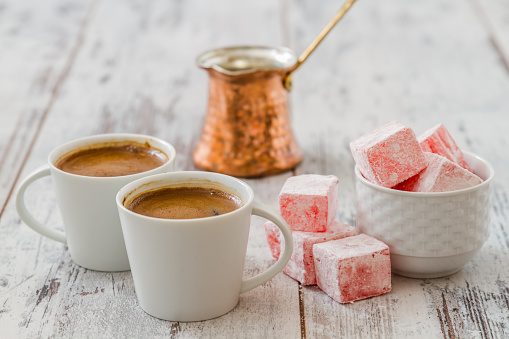Turkish Coffee Brewing Teaching: opportunities and challenges facing Turkish Coffee
Today we are going to discuss in depth the hot topics related to Turkish coffee, but first let's briefly introduce the background of Turkish coffee, which is actually the oldest way to make coffee. Back in Ottoman Turkey, aristocrats at that time accidentally learned to bake beans from the Yemenis, coffee evolved from a luxury, and finally became a drink that everyone was infatuated with. You may wonder, if Turkish coffee is really the oldest brewing method in history, why is there so much less market share of Turkish coffee than other kinds of coffee? And whether there are opportunities for the development of Turkish coffee in the future? What are the challenges facing? The following is the commentary and analysis of Tata Coffee Weekly:
1. Turkish coffee is popular in Turkey, Greece, the Middle East or Russia, but there is still room to flourish in other countries.
In Turkey, everyone says a cup of Turkish coffee, but in Greece, do not order a cup of Turkish coffee with the boss, it should be called Greek coffee. In Turkey, the Turkish coffee maker is called cezve, but in the Middle East it is called ibrik. The Russians say it is Middle Eastern coffee (Middle East). It's the same way of making coffee, but it has a different name. However, according to the information provided by the Turkish Coffee Association, the 2013 Turkish coffee champion Turgay Yildizli was a pioneer in bringing Turkish coffee to Asia. He has been teaching Turkish coffee in Thailand for many years. Although Kantata has a Turkish boss, we have only started to promote Turkish coffee since 2016. We look forward to seeing more markets and business opportunities to promote Turkish coffee in the future.

two。 Turkish coffee enters the boutique coffee market and starts international competitions later than other coffee brewing methods.
Since 2011, Turkish coffee has jumped out of the traditional brewing method and started to step into boutique coffee. And opened the door of the Turkish Coffee International Competition, inviting good players from various countries to join the competition, so as to improve the quality and brewing skills of Turkish coffee, but compared with other coffee brewing methods, Turkish coffee developed to boutique coffee a few years later. On the other hand, consumers' impression of Turkish coffee is mainly heavy, rather than light or slightly sour, so selling Turkish coffee is definitely different from the way it is actually brewed. Most of the coffee products sold locally are mainly commercial beans, or coffee powder that has been ground into powder. In terms of price comparison, there is some difference between fine coffee and local coffee powder. If Turkish coffee is to transform into boutique coffee, it really needs more promotion and efforts.
3. Strong consistency (Body) and flavor (Flavor) of Turkish coffee
Friends who have been to Turkey must know that authentic Turkish coffee will be extremely bitter if it is not sweetened. The main reason is that the coffee beans of Turkish coffee use a large number of Brazilian coffee beans. Brazilian coffee beans have many commercial advantages, the supply and price are stable, and Brazilian beans have strong consistency and flavor, so they are very suitable for Turkish coffee. Most Turkish coffee goes with desserts. In Turkey, they go with Turkish fudge. In the Middle East, they go with dried fruit. Once we tried to brew Turkish coffee with Kenyan coffee beans for our Turkish friends in Taiwan to try, but we obviously felt that they were not used to the consistency of the coffee, just like our Mapo tofu was abroad, but it was not locally spicy, but there was a kind of sweetness. I think we can understand this sense of disappointment.


Turkish dessert
4. The biggest difference between Turkish coffee and other types of coffee is that it does not filter coffee grounds.
The biggest challenge of our shop in selling Turkish coffee is the coffee grounds at the bottom of the cup, which is very different from our coffee drinking habits and culture. Many friends may not be used to the rustling feeling at the bottom of the cup. Unaccustomed to the taste, I think this will be the biggest challenge for Turkish coffee.

5. Turkish coffee is the most traditional way to make coffee, but there is still a lot of balance between tradition and innovation.
Does Turkish coffee have a chance to become a hot coffee for brewing coffee at home? With regard to this answer, we think that no matter what kind of coffee it is, there are opportunities and a unique market. For example, when I was still in graduate school, the teacher wanted me to introduce my brand and coffee products in class, but when I took out the hanging-ear coffee, none of the western students in the class knew how to use it. At this time, I found that hanging-ear coffee is not only a product, but also represents a habit of our life. When the living habits of countries are different, of course, many ways of life will change accordingly. Turkish coffee is a way of making coffee, an ancient coffee culture, but for us, it is also a new habit of life. And the new habits, is the need to have fun, coupled with the edification of time, can be integrated into life.
The taste of coffee in Taiwan likes to be clear and sweet, as well as sweet. Compared with the thick and heavy feeling of Turkish coffee, it is indeed an impact on the taste buds of Taiwanese.
So how do we adjust the strong taste when making Turkish coffee?
We offer several ways to adjust the taste:
1. Powder-to-water ratio: Turkish coffee is 60 grams of water mixed with 7 grams of coffee powder, and the powder-to-water ratio is 1.15 8.5. We found that if we adjust the Turkish coffee powder to about 5 grams, that is, to the general Taiwan coffee powder ratio at 1:12, in addition to being more suitable for Taiwanese friends in taste, we can also brew different coffee levels.
two。 Brewing time: the way Turkish coffee is brewed, we can often see that when the water boils from the Turkish coffee pot, the barista will first remove the Turkish coffee pot from the heat source, wait for the water to drop, and then put the Turkish coffee pot close to the heat source to make the water rise. This action will be repeated about three times in total. We found that this brewing action will increase the "bubble feeling" in the coffee, and the most important aspect of Turkish coffee is the "bubble feeling". In the local people think that good Turkish coffee needs to be matched with a lot of "foam feeling". But it is also because the brewing action is repeated three times, which makes the taste of Turkish coffee relatively thick, so how should we adjust it? Here, our suggestion is: when the water is to rise, we do not need to completely raise the water to the end of the Turkish coffee pot, we only need to boil a little to get the "foam feeling" satisfaction. On the other hand, the cooking time is shortened, and the texture will be relatively diluted.
Konstantinos Komninakis, the winner of the 2016 Turkish Coffee Competition, shows how to put the water into the cup just once in the demonstration brewing film, ready to serve coffee to consumers.
4. Choose fresh boutique coffee beans: most Turkish coffee, coffee products that have been ground into powder, if we switch to freshly ground coffee beans, and the roasting degree has been strictly selected and adjusted by baristas, I believe that the flavor of coffee will definitely change greatly. In addition, if the coffee is selected from the African series, it will have many fruit flavors, while Asian coffee beans will have cocoa and nut flavors.
5. Heat source control: when brewing Turkish coffee, the most important thing is to carefully control the heat source. Turkish coffee is not suitable to brew with too strong heat source. It is more suitable for light cooking over low heat to show more coffee flavor.
Does Turkish coffee have a chance to develop?
I think the answer is positive and there is an opportunity for development. The main reason is that coffee is acceptable to the market for new changes and new revolutions. Many years ago, we were still drinking three-in-one coffee, but now boutique cafes are blooming like flowers in Taiwan, and coffee smells like coffee in the streets. Over the years, many coffee lovers have invested a lot of money, time, and physical strength in promoting boutique coffee, giving Taiwan a new coffee style and affecting our lives. As mentioned earlier, coffee is not only a drink, but also a lifestyle. Turkish coffee is also a new style of life in Taiwan. We need more people and more resources to invest in order to generate new opportunities and development.
At the end of the article, I would like to share with you a Turkish proverb.
Gonul ne kahve ister ne kahvehane
Gonul sohbet ister kahve bahane
The heart is not looking forward to coffee or a cafe.
What I look forward to is friendship, and coffee is just an excuse.

Look forward to the Turkish coffee no matter where the coffee corner, there will be a new appearance, and sustainable development.
Important Notice :
前街咖啡 FrontStreet Coffee has moved to new addredd:
FrontStreet Coffee Address: 315,Donghua East Road,GuangZhou
Tel:020 38364473
- Prev

Introduction to the best brewing method of mocha pot
Professional barista communication Please follow the coffee workshop (Wechat official account cafe_style) recently fell in love with the mocha pot, especially to have a thick mocha pot in the morning, which is very suitable for the busy day when you need to go to work immediately. It's a secret weapon to help you wake up quickly. Coffee brewed from a mocha pot is espresso rather than hand-brewed coffee or siphon coffee. You can choose to use thick directly.
- Next

[easy iced coffee] 3 minutes to flush out the secret of good coffee
The exchange of professional baristas, please follow the coffee workshop (Wechat official account cafe_style). It is recommended to choose light roasted beans or light roasted beans. The layers are obvious. The characteristics of shallow roasted beans in ▼ show cinnamon color, taste and fragrance, with charming fruit sour flavor and fully retain the original flavor and nutritional value of coffee beans.
Related
- What is the meaning of lactic acid fermentation with coffee bean treatment?
- How to judge the state of foam by sound?
- How does the latte pull out the unicorn pattern? Come to get for a little trick to improve the flower pull!
- Will flower pulling affect the taste of the latte?
- Do you know the history of coffee?
- The difference between honey treatment and sun washing what is raisin honey treatment?
- What kind of milk can a novice use to make coffee foam to keep the foam longer? The correct method and skills of milking tutorial sharing
- Why do washed coffee beans taste sour? Flavor characteristics of washed Coffee
- Introduction to the skill of how to practice the size and height of water injection around the circle of hand-brewed coffee
- How do beginners practice coffee flower drawing from scratch?

